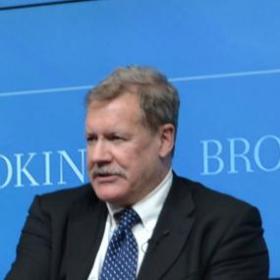
Iran defeats Russia, Europe overtakes USA
International competition has many levels. In Brussels this past week, Prime Minister Putin felt the need to disparage the leadership of Iran as a negative outcome of European foreign policy. After railing against alleged “European” support of Ayatollah Khomeini before 1979, Putin took on Palestine.
"Not long ago at all, our partners came out actively for honest democratic elections in the Palestinian territories," Putin said. "Wonderful! Well done, lads! And it turns out Hamas wins, the same people you are calling a terrorist organization and have started to fight against." (Moscow Times).
At one level of politics, Putin’s analysis of Iran and Palestine is rational. On another level, there is a deep neuralgia in Russia about the Muslim world. Putin said that Russia was concerned about the consequences of the recent uprisings in Arab countries for Russian security. He also warned (correctly) that the events could have negative consequences for Europe. The underlying anxiety here is not unique to Mr Putin. He is showing a discomfort here many Western leaders share and that will only grow.
The anxiety comes about because of shifting power relationships in many fields of national endeavor. On a much lower level, this was symbolized in a tantalizing way in the shock defeat of Russia by Iran (1-0) in a football friendly in Dubai on 9 February. Perhaps the patriotic, sports-loving Mr Putin was smarting from the defeat. The Dubai game, a warm-up for the Euro 2012 qualifiers, was only held in Dubai so that the Russian football federation could get the money from the TV rights involved in playing a team from the region.
More seriously though, the Putin visit to Brussels and the concerns he expressed reflect fundamental shifts in world power at a time when, with the uprisings, revolts and wars in the Muslim world, there is an historic shift under way in world politics. Russia’s relations with the European Union (EU) now look very different from three years ago. Russia has overtaken China as an economic partner of the EU and Putin is determined to make Russia and the EU partners in international security affairs as well.
At exactly the time when the world press was trumpeting the statistic that the Chinese economy had overtaken the Japanese economy, and would eventually surpass the American economy, a different data set from the IMF revealed another shift. The US economy was correctly reassigned to number two spot behind the European Union in GDP on a Purchasing Power Parity basis. And Indian GDP is within a whisker of Japan’s. The bargaining power relationships within the G20 and IMF are shifting and on the global stage have shifted in Europe’s favor.
So, the EU is not a country, some might say. Yes, but it is an “economy”, a single economy, in a world where, as a good Marxists might tell you, economics is in command. The Articles of Agreement of the IMF (Section XIII) dictate that “The principal office of the Fund shall be located in the territory of the member having the largest quota”. Well the European Union now has almost double the quota of the United States, around 30 per cent of the total for the EU compared with just over 17 per cent for the United States, and China’s un-naturally low 3.72 per cent. So the IMF headquarters really should move to Europe.
Journalistic flourishes aside, what does this growing list of re-alignments of politics and power mean? At the very least, in economic and social terms, it means that the initiative for change, the impulse for reform and the power for transformation are slipping even faster from American hands. Russia knows it and is looking for European partnership, especially to secure the southern flanks not just of Russia but of Europe as a whole.

